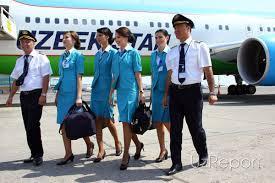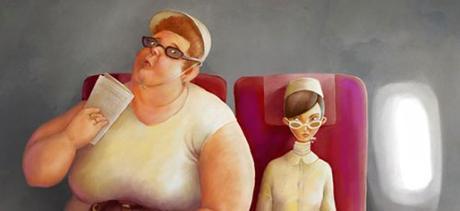Passenger airlines already are charging fees for checked-in luggage and have become more restrictive about carry-on luggage.
Now, a Central Asia airline, Uzbekistan Airways, will begin weighing passengers.

Soo Kim reports for the UK Telegraph, Aug. 12, 2015, that Uzbekistan Airways passengers will be directed to a “special weighing machine” at the departure gate, to determine each person’s average weight with their hand baggage.
The airline said that individual passengers’ weights would not be disclosed, and “full confidentiality of results is guaranteed.” The company said in a statement, “According to the rules of International Air Transport Association, airlines are obliged to carry out the regular procedures of preflight control passengers weighing with hand baggage to observe requirements for ensuring flight safety.”
The airline has not made it clear whether heavier passengers will be charged a fee, or excluded from flights on smaller planes. It is also not known what measures would be taken should the total weight of the passengers and their hand luggage exceeds an aircraft’s weight limit and guidelines.
According to the World Health Organization, in 2008 more than 44% of Uzbekistanis 20 years and older were overweight; nearly 15% were obese. The percentage of obese is expected to increase to 13% of men and 20% of women by 2020.
Note: If current trends continue, by the year 2030, in 15 years, more than 4 of every 10 (42%) Americans may become obese and 11% severely obese.
Uzbekistan Airways is not the first airline to keep an eye on passengers’ weights. In 2013, Samoa Air became the world’s first airline to charge passengers by their weight rather than per seat, in a bid to raise obesity awareness and improve public health. The Pacific island nations served by Samoa Air have some of the world’s highest rates of obesity.
Samoa Air weighs passengers on scales at the airport. Passengers do not pay for a seat but pay a fixed price per kilogram, which varies according to the length of the route. Head of Samoa Air Chris Langton said the system was fairer and that some families with small children would pay substantially cheaper fares. In the same year, the airline also introduced a special “XL class” — a wider row in its aircraft for passengers weighing more than 286 pounds.

In 2012, an Australian man, James Bassos, 38, sued Etihad Airways in the District Court in Queensland, claiming that he suffered a permanent back injury from being seated next to an obese man on a 14-hour flight from Abu Dhabi to Sydney.
Bassos claims that the person “of large body mass” seated next to him spilled into his chair and frequently coughed and expelled fluid from his mouth, forcing Bassos to spend hours twisting and contorting his body to avoid touching him. After five hours, he felt marked pain and discomfort in his back and asked flight crew to move, but was told the plane was full. When the pain got worse he asked again and was allowed to move to a crew seat at the back of the plane. However, Bassos twice had to return to his original seat, including for the final 90 minutes before landing, after a staff member invoked a security procedure.
The Emirates-based interior designer says he now suffers back pain on exertion and after prolonged sitting and standing. His sleep and concentration has allegedly been affected and he has been forced to take time off work. Bassos’ lawsuit claims more than $227,000 for medical expenses, lost earnings and superannuation.
If U.S. airlines begin weighing and charging passengers by the pound, I can just hear the protests about unfairness and discrimination. Already people who think of themselves as “big-boned” complain that BMI charts are unfair, although experts say a larger frame accounts at most for an extra 2 pounds. Wouldn’t there be a gender difference since the average man weighs more than the average woman?
Then there are the racial/ethnic differences. In 2013, 63.8% of U.S. adults were overweight or obese, but there are decided racial/ethnic differences: (Source)
- 72.7% of Blacks were overweight/obese.
- 68.4% of Hispanics were overweight/obese.
- 68.1% of American Indians were overweight/obese.
- 62.8% of Whites were overweight/obese.
- 41.3% of Asians-Pacifics were overweight/obese.
Telegraph has a poll, “Would you get on a flight if you had to be weighed first.” I am incredulous that most people approve of Uzbekistan Airways’ intrusion into the privacy of passengers. So far, with 4,982 votes, the polling results are:
- Yes it’s a great idea – 57%
- No way – 33%
- Only if I was confident of confidentiality – 10%
Sound off in our poll!
Take Our Poll~Éowyn

